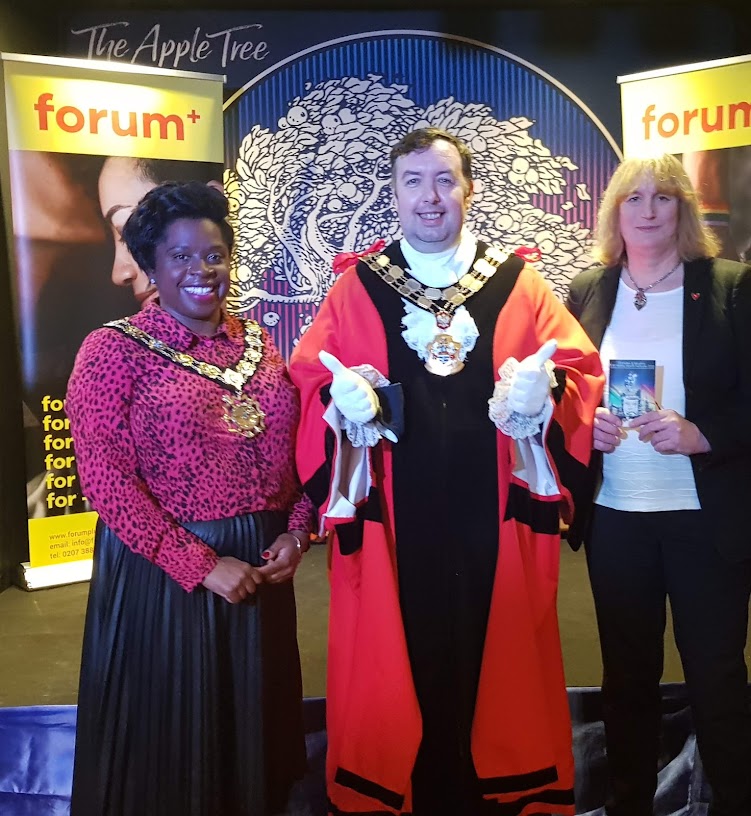LGBT+ CAMDEN: We’re making the history of the future right here
Tessa Havers-Strong helps launch history month
Friday, 4th February 2022 — By Anna Lamche

forum+ Tessa Havers-Strong (right) is joined by the mayors of Camden and Islington, Sabrina Francis and Troy Gallagher
FROM the molly houses of the eighteenth century to the UK’s first legal gay marriage in 2014, Camden and Islington have a long and rich history to celebrate this LGBT+ History Month.
However, an organiser of the events taking place this February has stressed that this LGBT+ History Month is as much about the future as the past.
“It’s not just a way to look back – it’s also an opportunity to look forward,” said Tessa Havers-Strong, director of the forum+ charity.
“As members of the LGBT community, we’re still making history.”
The programme of events that will run throughout February kicked off on Friday at a pop-up LGBT+ bar in Clerkenwell, with the mayors of Camden and Islington attending to give speeches.
After Covid restrictions forced last year’s LGBT+ history month online, Ms Havers-Strong has said it was “very important” to get back to a programme of in-person events.
The impact of the pandemic on mental health is well documented, with a forum+ survey finding the lockdowns “had a universally negative impact on people across all ages, ethnic groups, sexes and genders,” Ms Havers-Strong said.
“We’re all gregarious creatures: humans are meant to socialise, it’s good for the soul.”
But a darker side has accompanied the easing of restrictions: as we emerge from the pandemic, rates of sexual orientation hate crime have soared across London.
“During lockdown, hate crimes dropped across the board because people weren’t in contact with each other,” said Ms Havers-Strong.
“But in the summer of 2020, there was a rebound. We saw a huge spike in reporting crimes that went slightly above pre-pandemic levels. Now it’s back to where it was pre-pandemic.”
While there are shocking examples of violence in the recent past, Ms Havers-Strong has said the most significant problem is “chronic, low-level anti-social behaviour.”
“There haven’t been homophobic or transphobic murders in a long while – it’s more about what’s happening in neighbourhood disputes, where homophobic language is being used,” she said.
There have also been “a lot of reports of people feeling they’ve been transphobically or homophobically attacked online,” Ms Havers-Strong has said.
“I’m all for people expressing their opinions, but if someone is being attacked and targeted, that is wrong. There is empirical evidence to suggest acceptance of LGBT people has gone in the wrong direction, with fewer people accepting of LGBT people.
“Austerity can cause it, there can be many factors that cause it.”
This trend hasn’t gone unnoticed at an international level. Only last week, the UK was named a “country of concern” by Europe’s overarching human rights body, the Council of Europe, alongside Hungary, Poland, Russia and Turkey, notable for its “extensive and often virulent attacks on the rights of LGBT+ people.”
Against this backdrop, LGBT+ History Month is more vital than ever, offering us a chance to reflect on the contributions of the LGBT+ community to life in North London.
forum+ has partnered with a range of organisations across Camden and Islington to create a month packed full of events, from writing workshops to art exhibitions to heritage trails – you can see the listings among the features on the following pages.
One of the events Ms Havers-Strong is most looking forward to is “our poetry night, which is happening in person for the first time in a few years at the Apple Tree Pub’s amazing venue,” she said.
Over the next year, forum+ aims to “have a more confident and thriving LGBT community which doesn’t experience discrimination.
“We’re empowering people to understand the law – quite often people are not necessarily aware that they can report [discrimination], or because it happens on such a daily basis, they feel it’s not worth reporting,” she said.
“We want people to feel more comfortable and understand what their rights are.”